Annotated Bibliography: Nursing Leadership in Healthcare Settings
VerifiedAdded on 2022/10/11
|8
|1284
|16
Annotated Bibliography
AI Summary
This annotated bibliography analyzes three scholarly articles related to nursing leadership. The first article examines the importance of leadership styles, particularly transformational leadership, in improving the quality of care in healthcare settings. It highlights the positive impact of leadership on nurses' skills and patient outcomes. The second article explores the challenges and opportunities within nursing leadership, emphasizing the need for adaptive leadership approaches to navigate complex healthcare environments. The third article focuses on the relationship between management competency, leadership, and the development of a positive environment for nurses. The assignment provides summaries, applications, analyses, and evaluations of each article, highlighting the interconnectedness of nursing and effective leadership.
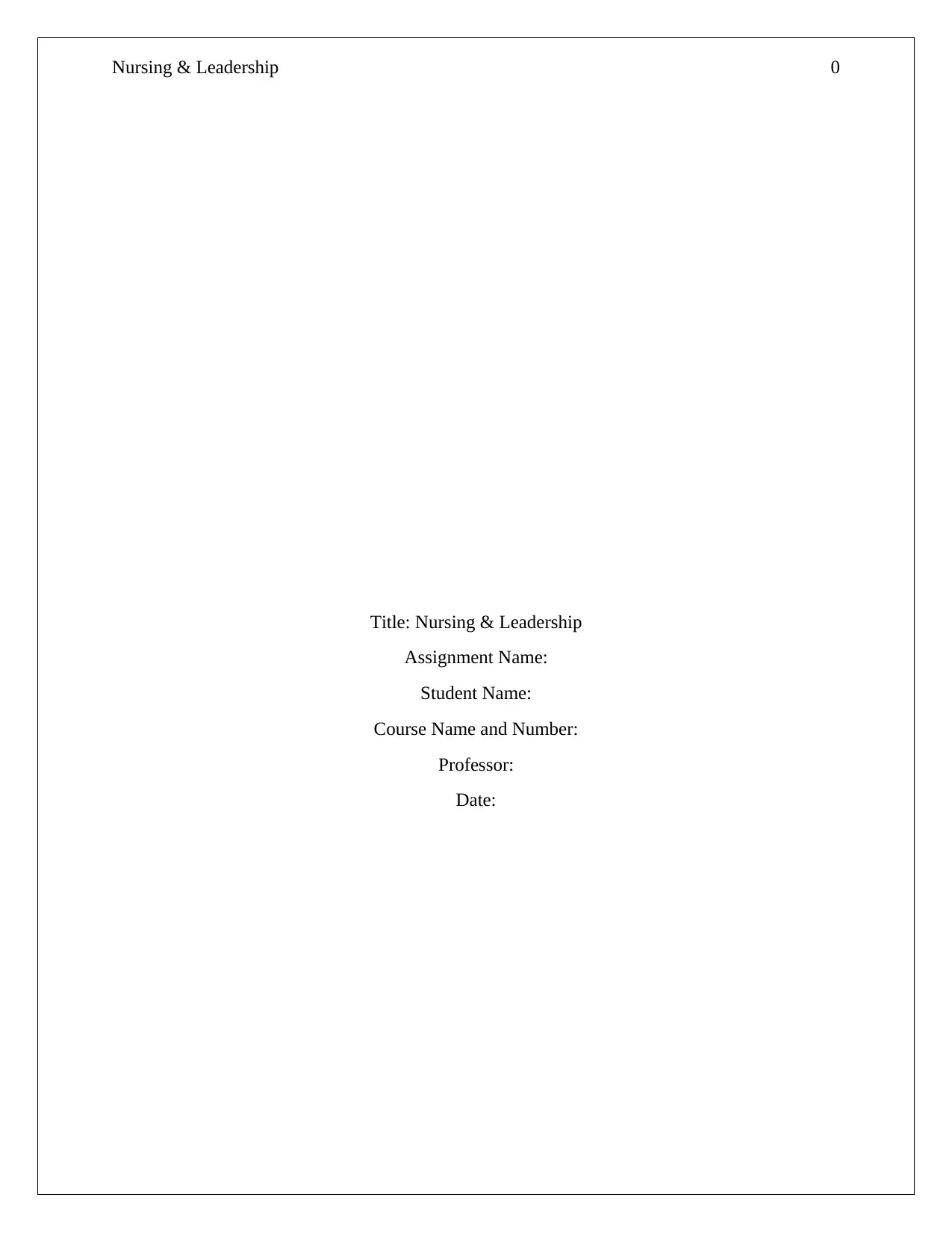
Nursing & Leadership 0
Title: Nursing & Leadership
Assignment Name:
Student Name:
Course Name and Number:
Professor:
Date:
Title: Nursing & Leadership
Assignment Name:
Student Name:
Course Name and Number:
Professor:
Date:
Paraphrase This Document
Need a fresh take? Get an instant paraphrase of this document with our AI Paraphraser
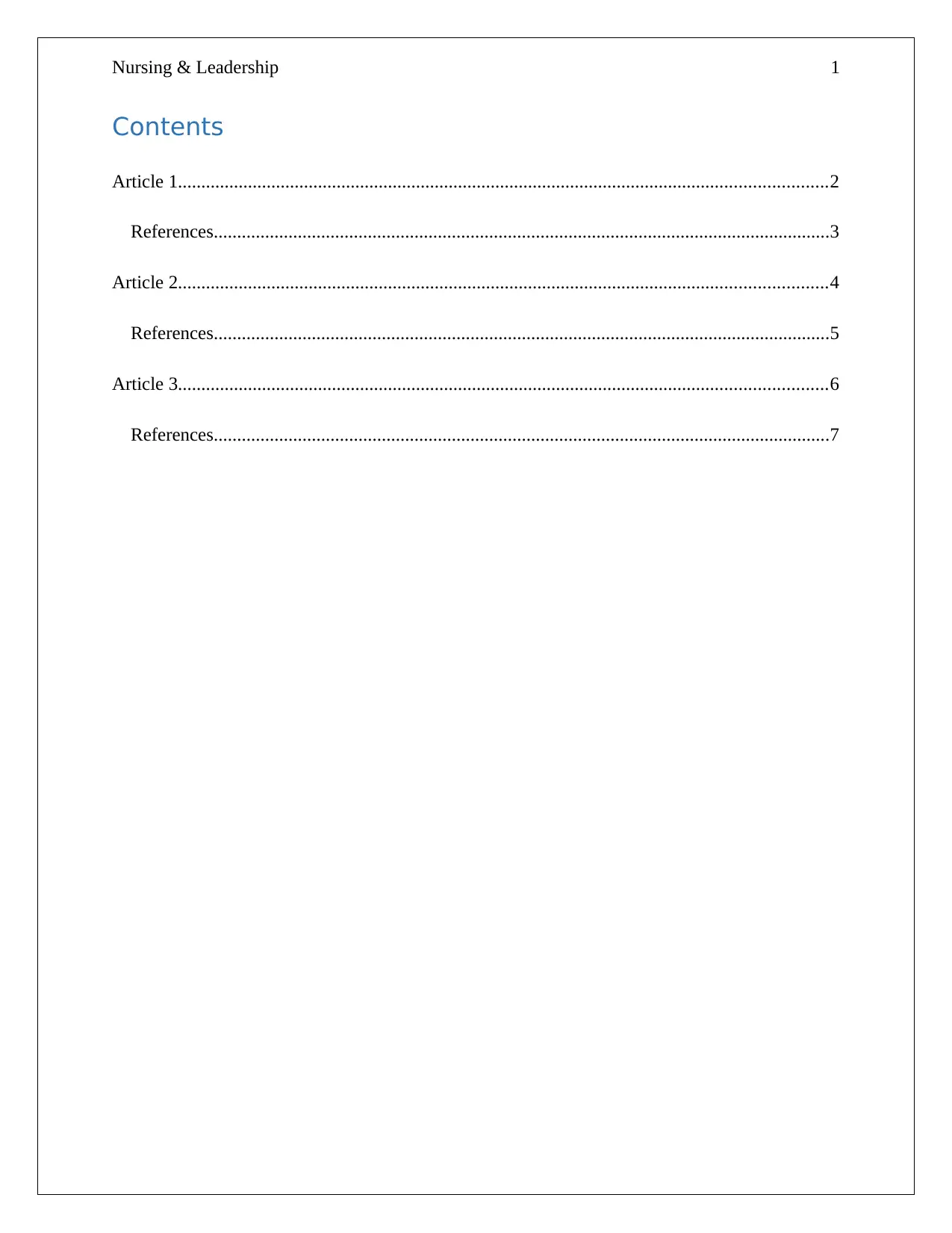
Nursing & Leadership 1
Contents
Article 1...........................................................................................................................................2
References....................................................................................................................................3
Article 2...........................................................................................................................................4
References....................................................................................................................................5
Article 3...........................................................................................................................................6
References....................................................................................................................................7
Contents
Article 1...........................................................................................................................................2
References....................................................................................................................................3
Article 2...........................................................................................................................................4
References....................................................................................................................................5
Article 3...........................................................................................................................................6
References....................................................................................................................................7
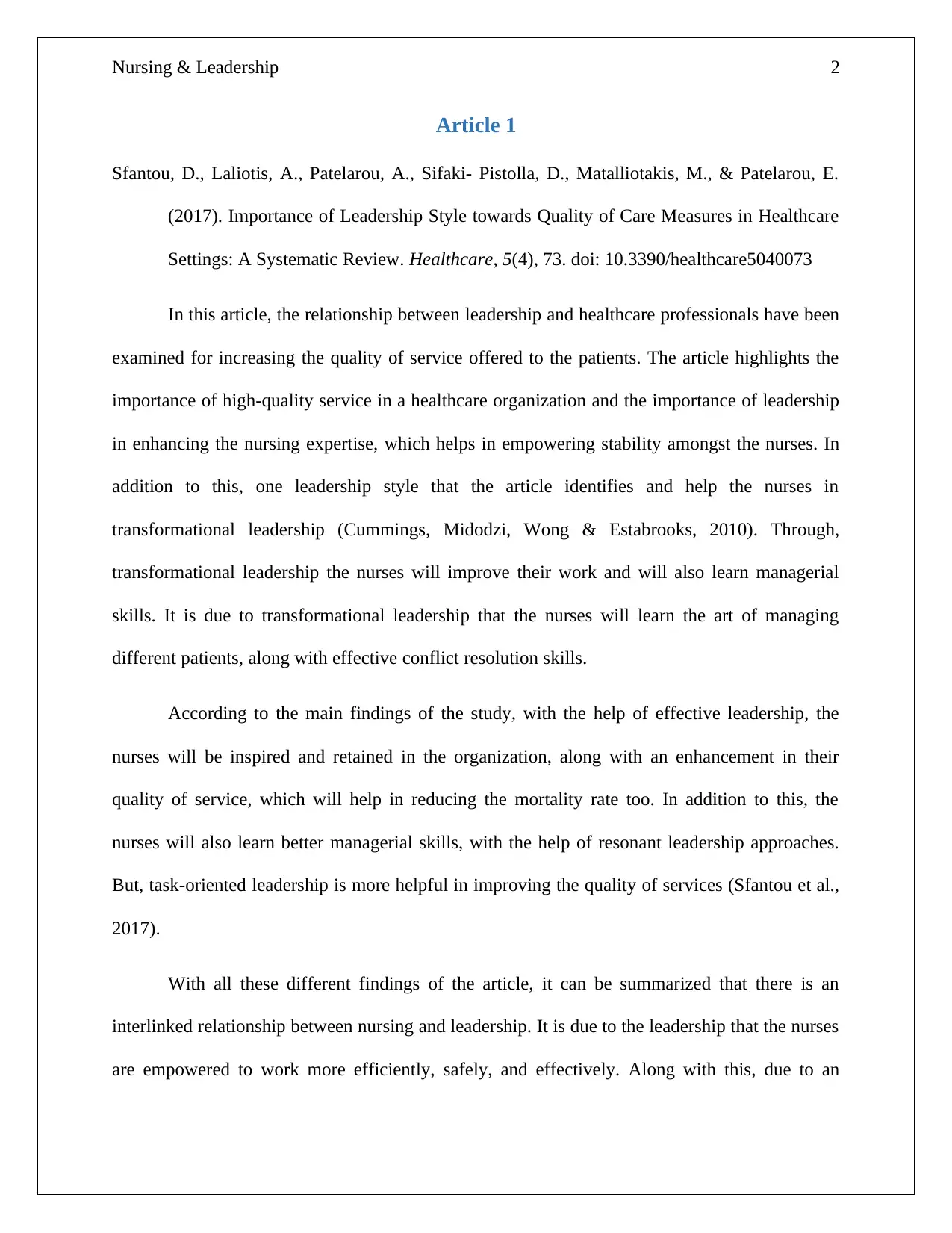
Nursing & Leadership 2
Article 1
Sfantou, D., Laliotis, A., Patelarou, A., Sifaki- Pistolla, D., Matalliotakis, M., & Patelarou, E.
(2017). Importance of Leadership Style towards Quality of Care Measures in Healthcare
Settings: A Systematic Review. Healthcare, 5(4), 73. doi: 10.3390/healthcare5040073
In this article, the relationship between leadership and healthcare professionals have been
examined for increasing the quality of service offered to the patients. The article highlights the
importance of high-quality service in a healthcare organization and the importance of leadership
in enhancing the nursing expertise, which helps in empowering stability amongst the nurses. In
addition to this, one leadership style that the article identifies and help the nurses in
transformational leadership (Cummings, Midodzi, Wong & Estabrooks, 2010). Through,
transformational leadership the nurses will improve their work and will also learn managerial
skills. It is due to transformational leadership that the nurses will learn the art of managing
different patients, along with effective conflict resolution skills.
According to the main findings of the study, with the help of effective leadership, the
nurses will be inspired and retained in the organization, along with an enhancement in their
quality of service, which will help in reducing the mortality rate too. In addition to this, the
nurses will also learn better managerial skills, with the help of resonant leadership approaches.
But, task-oriented leadership is more helpful in improving the quality of services (Sfantou et al.,
2017).
With all these different findings of the article, it can be summarized that there is an
interlinked relationship between nursing and leadership. It is due to the leadership that the nurses
are empowered to work more efficiently, safely, and effectively. Along with this, due to an
Article 1
Sfantou, D., Laliotis, A., Patelarou, A., Sifaki- Pistolla, D., Matalliotakis, M., & Patelarou, E.
(2017). Importance of Leadership Style towards Quality of Care Measures in Healthcare
Settings: A Systematic Review. Healthcare, 5(4), 73. doi: 10.3390/healthcare5040073
In this article, the relationship between leadership and healthcare professionals have been
examined for increasing the quality of service offered to the patients. The article highlights the
importance of high-quality service in a healthcare organization and the importance of leadership
in enhancing the nursing expertise, which helps in empowering stability amongst the nurses. In
addition to this, one leadership style that the article identifies and help the nurses in
transformational leadership (Cummings, Midodzi, Wong & Estabrooks, 2010). Through,
transformational leadership the nurses will improve their work and will also learn managerial
skills. It is due to transformational leadership that the nurses will learn the art of managing
different patients, along with effective conflict resolution skills.
According to the main findings of the study, with the help of effective leadership, the
nurses will be inspired and retained in the organization, along with an enhancement in their
quality of service, which will help in reducing the mortality rate too. In addition to this, the
nurses will also learn better managerial skills, with the help of resonant leadership approaches.
But, task-oriented leadership is more helpful in improving the quality of services (Sfantou et al.,
2017).
With all these different findings of the article, it can be summarized that there is an
interlinked relationship between nursing and leadership. It is due to the leadership that the nurses
are empowered to work more efficiently, safely, and effectively. Along with this, due to an
⊘ This is a preview!⊘
Do you want full access?
Subscribe today to unlock all pages.

Trusted by 1+ million students worldwide
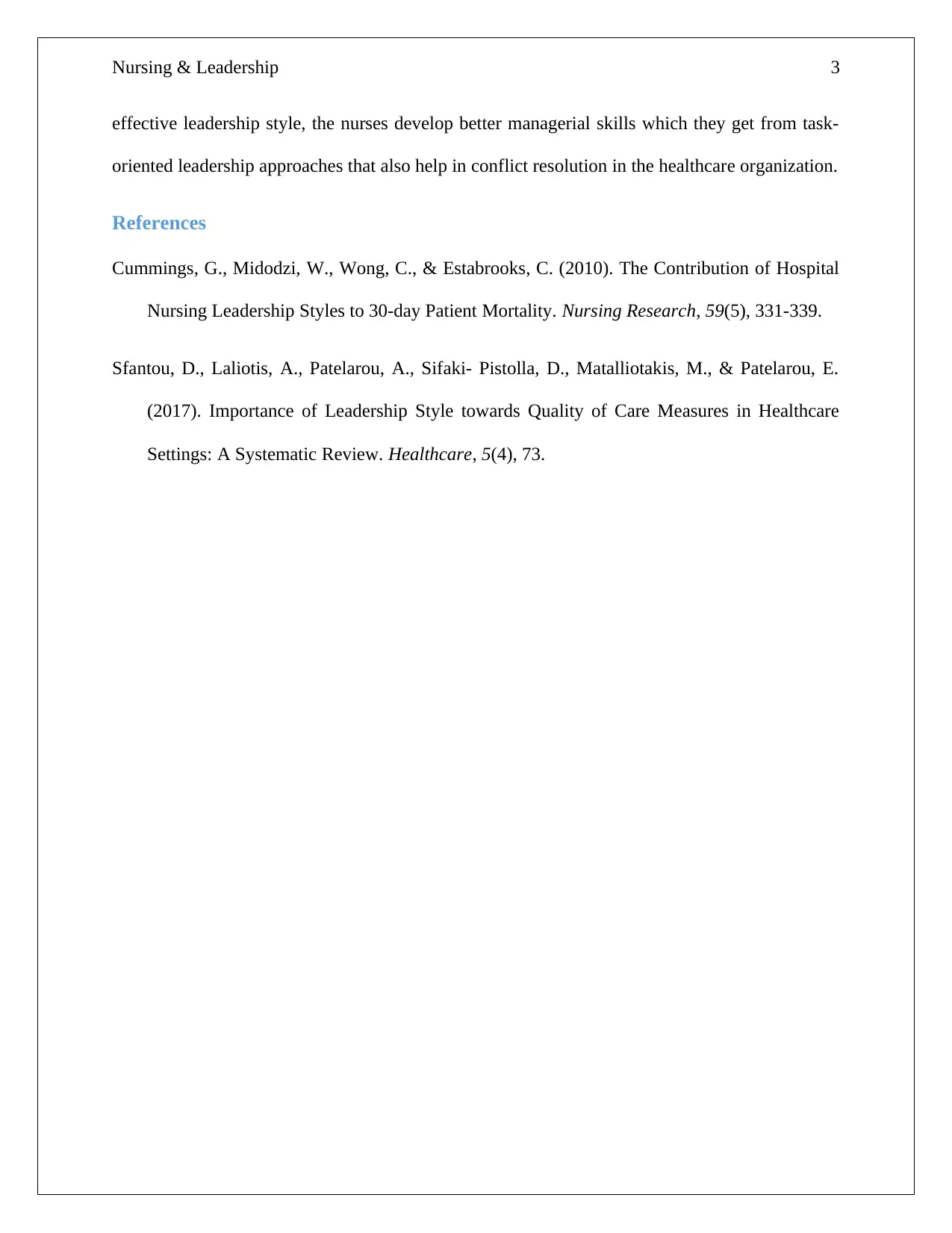
Nursing & Leadership 3
effective leadership style, the nurses develop better managerial skills which they get from task-
oriented leadership approaches that also help in conflict resolution in the healthcare organization.
References
Cummings, G., Midodzi, W., Wong, C., & Estabrooks, C. (2010). The Contribution of Hospital
Nursing Leadership Styles to 30-day Patient Mortality. Nursing Research, 59(5), 331-339.
Sfantou, D., Laliotis, A., Patelarou, A., Sifaki- Pistolla, D., Matalliotakis, M., & Patelarou, E.
(2017). Importance of Leadership Style towards Quality of Care Measures in Healthcare
Settings: A Systematic Review. Healthcare, 5(4), 73.
effective leadership style, the nurses develop better managerial skills which they get from task-
oriented leadership approaches that also help in conflict resolution in the healthcare organization.
References
Cummings, G., Midodzi, W., Wong, C., & Estabrooks, C. (2010). The Contribution of Hospital
Nursing Leadership Styles to 30-day Patient Mortality. Nursing Research, 59(5), 331-339.
Sfantou, D., Laliotis, A., Patelarou, A., Sifaki- Pistolla, D., Matalliotakis, M., & Patelarou, E.
(2017). Importance of Leadership Style towards Quality of Care Measures in Healthcare
Settings: A Systematic Review. Healthcare, 5(4), 73.
Paraphrase This Document
Need a fresh take? Get an instant paraphrase of this document with our AI Paraphraser
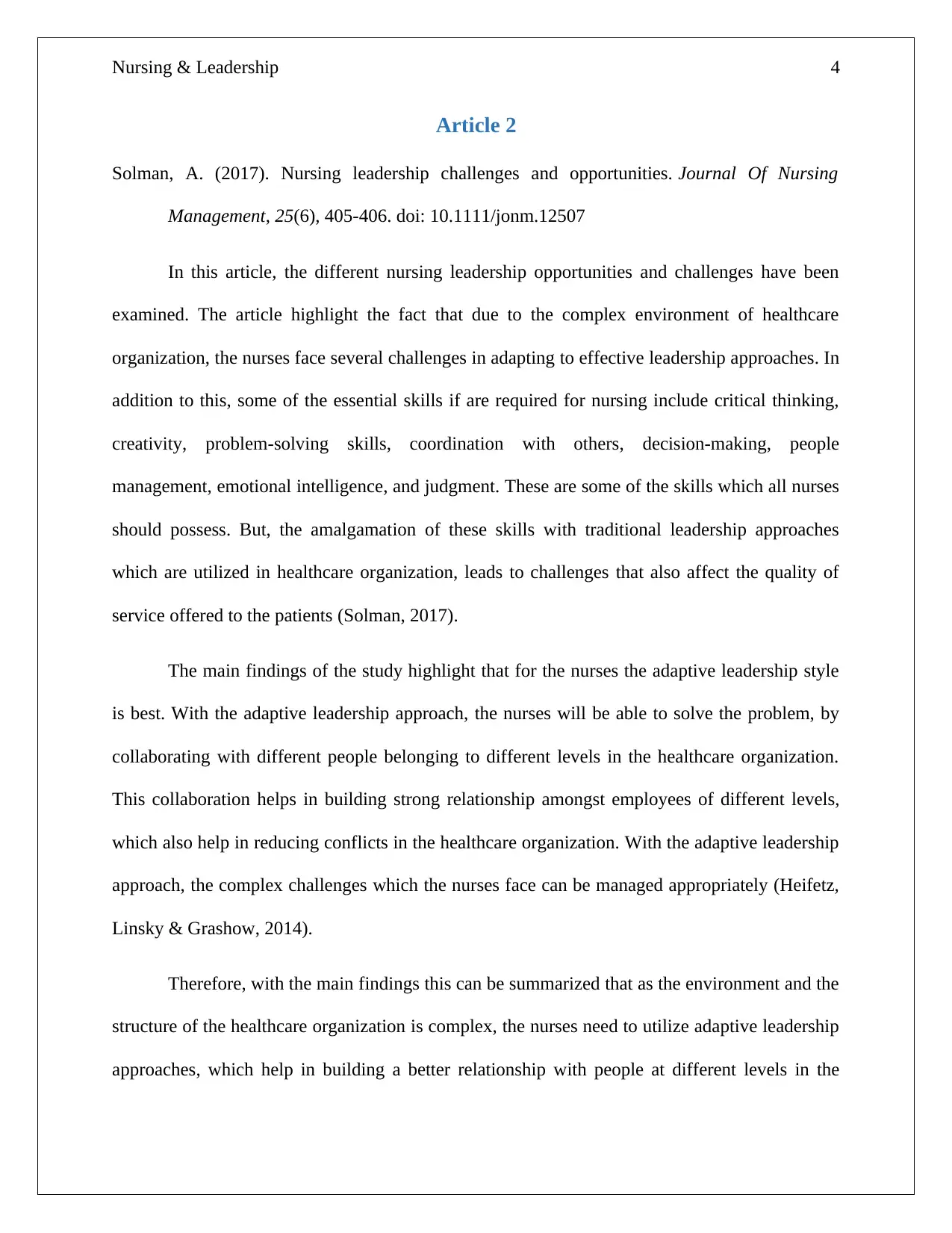
Nursing & Leadership 4
Article 2
Solman, A. (2017). Nursing leadership challenges and opportunities. Journal Of Nursing
Management, 25(6), 405-406. doi: 10.1111/jonm.12507
In this article, the different nursing leadership opportunities and challenges have been
examined. The article highlight the fact that due to the complex environment of healthcare
organization, the nurses face several challenges in adapting to effective leadership approaches. In
addition to this, some of the essential skills if are required for nursing include critical thinking,
creativity, problem-solving skills, coordination with others, decision-making, people
management, emotional intelligence, and judgment. These are some of the skills which all nurses
should possess. But, the amalgamation of these skills with traditional leadership approaches
which are utilized in healthcare organization, leads to challenges that also affect the quality of
service offered to the patients (Solman, 2017).
The main findings of the study highlight that for the nurses the adaptive leadership style
is best. With the adaptive leadership approach, the nurses will be able to solve the problem, by
collaborating with different people belonging to different levels in the healthcare organization.
This collaboration helps in building strong relationship amongst employees of different levels,
which also help in reducing conflicts in the healthcare organization. With the adaptive leadership
approach, the complex challenges which the nurses face can be managed appropriately (Heifetz,
Linsky & Grashow, 2014).
Therefore, with the main findings this can be summarized that as the environment and the
structure of the healthcare organization is complex, the nurses need to utilize adaptive leadership
approaches, which help in building a better relationship with people at different levels in the
Article 2
Solman, A. (2017). Nursing leadership challenges and opportunities. Journal Of Nursing
Management, 25(6), 405-406. doi: 10.1111/jonm.12507
In this article, the different nursing leadership opportunities and challenges have been
examined. The article highlight the fact that due to the complex environment of healthcare
organization, the nurses face several challenges in adapting to effective leadership approaches. In
addition to this, some of the essential skills if are required for nursing include critical thinking,
creativity, problem-solving skills, coordination with others, decision-making, people
management, emotional intelligence, and judgment. These are some of the skills which all nurses
should possess. But, the amalgamation of these skills with traditional leadership approaches
which are utilized in healthcare organization, leads to challenges that also affect the quality of
service offered to the patients (Solman, 2017).
The main findings of the study highlight that for the nurses the adaptive leadership style
is best. With the adaptive leadership approach, the nurses will be able to solve the problem, by
collaborating with different people belonging to different levels in the healthcare organization.
This collaboration helps in building strong relationship amongst employees of different levels,
which also help in reducing conflicts in the healthcare organization. With the adaptive leadership
approach, the complex challenges which the nurses face can be managed appropriately (Heifetz,
Linsky & Grashow, 2014).
Therefore, with the main findings this can be summarized that as the environment and the
structure of the healthcare organization is complex, the nurses need to utilize adaptive leadership
approaches, which help in building a better relationship with people at different levels in the
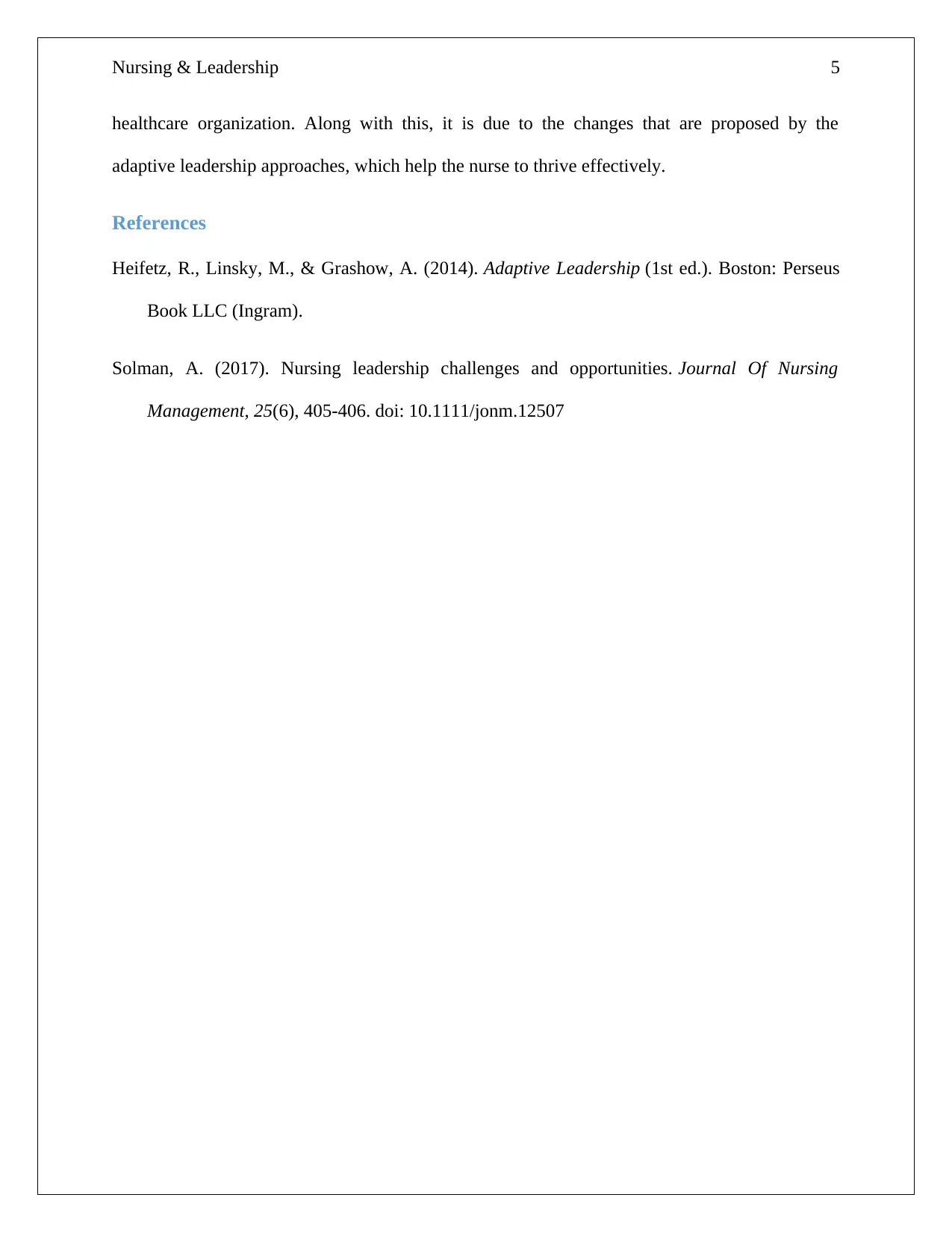
Nursing & Leadership 5
healthcare organization. Along with this, it is due to the changes that are proposed by the
adaptive leadership approaches, which help the nurse to thrive effectively.
References
Heifetz, R., Linsky, M., & Grashow, A. (2014). Adaptive Leadership (1st ed.). Boston: Perseus
Book LLC (Ingram).
Solman, A. (2017). Nursing leadership challenges and opportunities. Journal Of Nursing
Management, 25(6), 405-406. doi: 10.1111/jonm.12507
healthcare organization. Along with this, it is due to the changes that are proposed by the
adaptive leadership approaches, which help the nurse to thrive effectively.
References
Heifetz, R., Linsky, M., & Grashow, A. (2014). Adaptive Leadership (1st ed.). Boston: Perseus
Book LLC (Ingram).
Solman, A. (2017). Nursing leadership challenges and opportunities. Journal Of Nursing
Management, 25(6), 405-406. doi: 10.1111/jonm.12507
⊘ This is a preview!⊘
Do you want full access?
Subscribe today to unlock all pages.

Trusted by 1+ million students worldwide
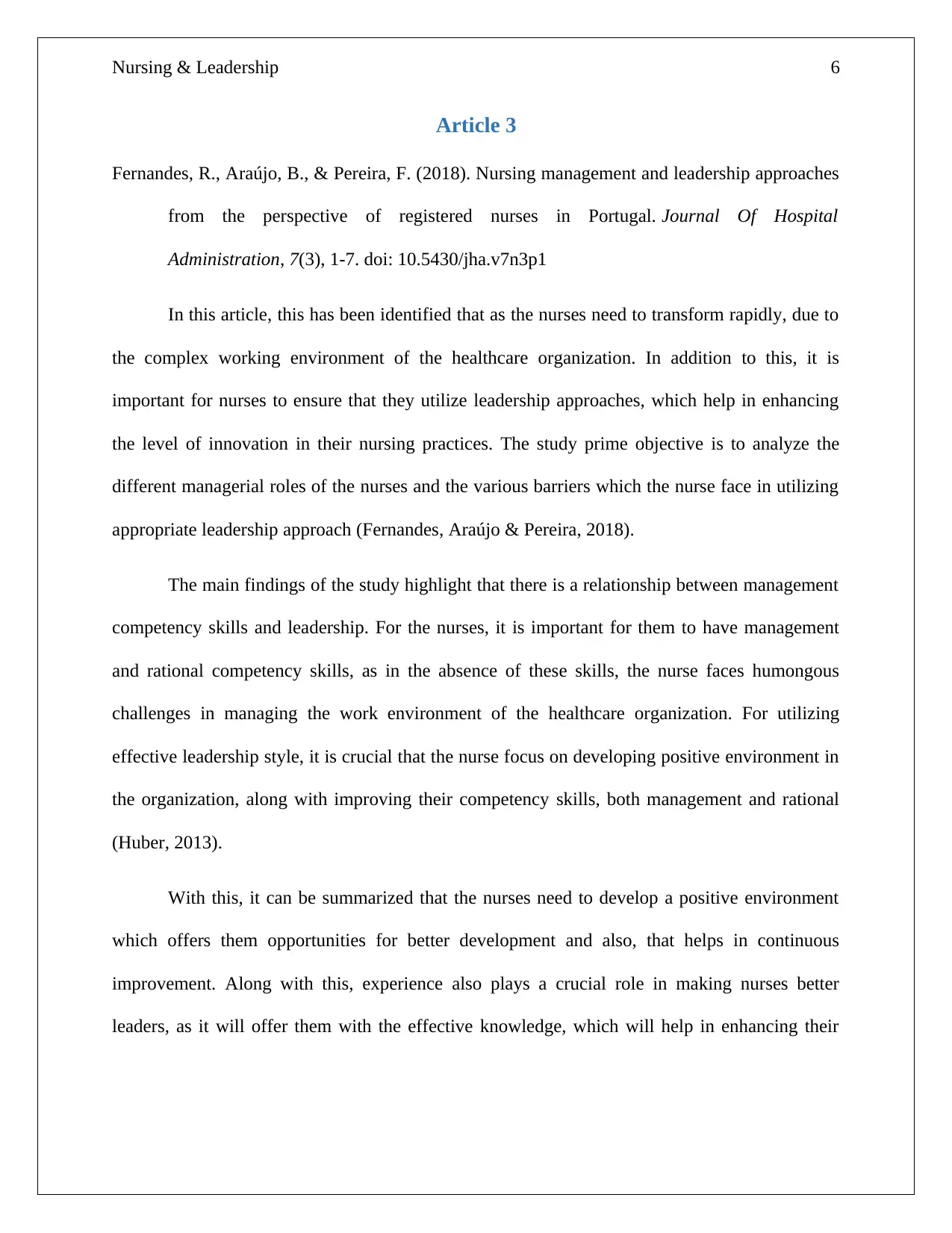
Nursing & Leadership 6
Article 3
Fernandes, R., Araújo, B., & Pereira, F. (2018). Nursing management and leadership approaches
from the perspective of registered nurses in Portugal. Journal Of Hospital
Administration, 7(3), 1-7. doi: 10.5430/jha.v7n3p1
In this article, this has been identified that as the nurses need to transform rapidly, due to
the complex working environment of the healthcare organization. In addition to this, it is
important for nurses to ensure that they utilize leadership approaches, which help in enhancing
the level of innovation in their nursing practices. The study prime objective is to analyze the
different managerial roles of the nurses and the various barriers which the nurse face in utilizing
appropriate leadership approach (Fernandes, Araújo & Pereira, 2018).
The main findings of the study highlight that there is a relationship between management
competency skills and leadership. For the nurses, it is important for them to have management
and rational competency skills, as in the absence of these skills, the nurse faces humongous
challenges in managing the work environment of the healthcare organization. For utilizing
effective leadership style, it is crucial that the nurse focus on developing positive environment in
the organization, along with improving their competency skills, both management and rational
(Huber, 2013).
With this, it can be summarized that the nurses need to develop a positive environment
which offers them opportunities for better development and also, that helps in continuous
improvement. Along with this, experience also plays a crucial role in making nurses better
leaders, as it will offer them with the effective knowledge, which will help in enhancing their
Article 3
Fernandes, R., Araújo, B., & Pereira, F. (2018). Nursing management and leadership approaches
from the perspective of registered nurses in Portugal. Journal Of Hospital
Administration, 7(3), 1-7. doi: 10.5430/jha.v7n3p1
In this article, this has been identified that as the nurses need to transform rapidly, due to
the complex working environment of the healthcare organization. In addition to this, it is
important for nurses to ensure that they utilize leadership approaches, which help in enhancing
the level of innovation in their nursing practices. The study prime objective is to analyze the
different managerial roles of the nurses and the various barriers which the nurse face in utilizing
appropriate leadership approach (Fernandes, Araújo & Pereira, 2018).
The main findings of the study highlight that there is a relationship between management
competency skills and leadership. For the nurses, it is important for them to have management
and rational competency skills, as in the absence of these skills, the nurse faces humongous
challenges in managing the work environment of the healthcare organization. For utilizing
effective leadership style, it is crucial that the nurse focus on developing positive environment in
the organization, along with improving their competency skills, both management and rational
(Huber, 2013).
With this, it can be summarized that the nurses need to develop a positive environment
which offers them opportunities for better development and also, that helps in continuous
improvement. Along with this, experience also plays a crucial role in making nurses better
leaders, as it will offer them with the effective knowledge, which will help in enhancing their
Paraphrase This Document
Need a fresh take? Get an instant paraphrase of this document with our AI Paraphraser
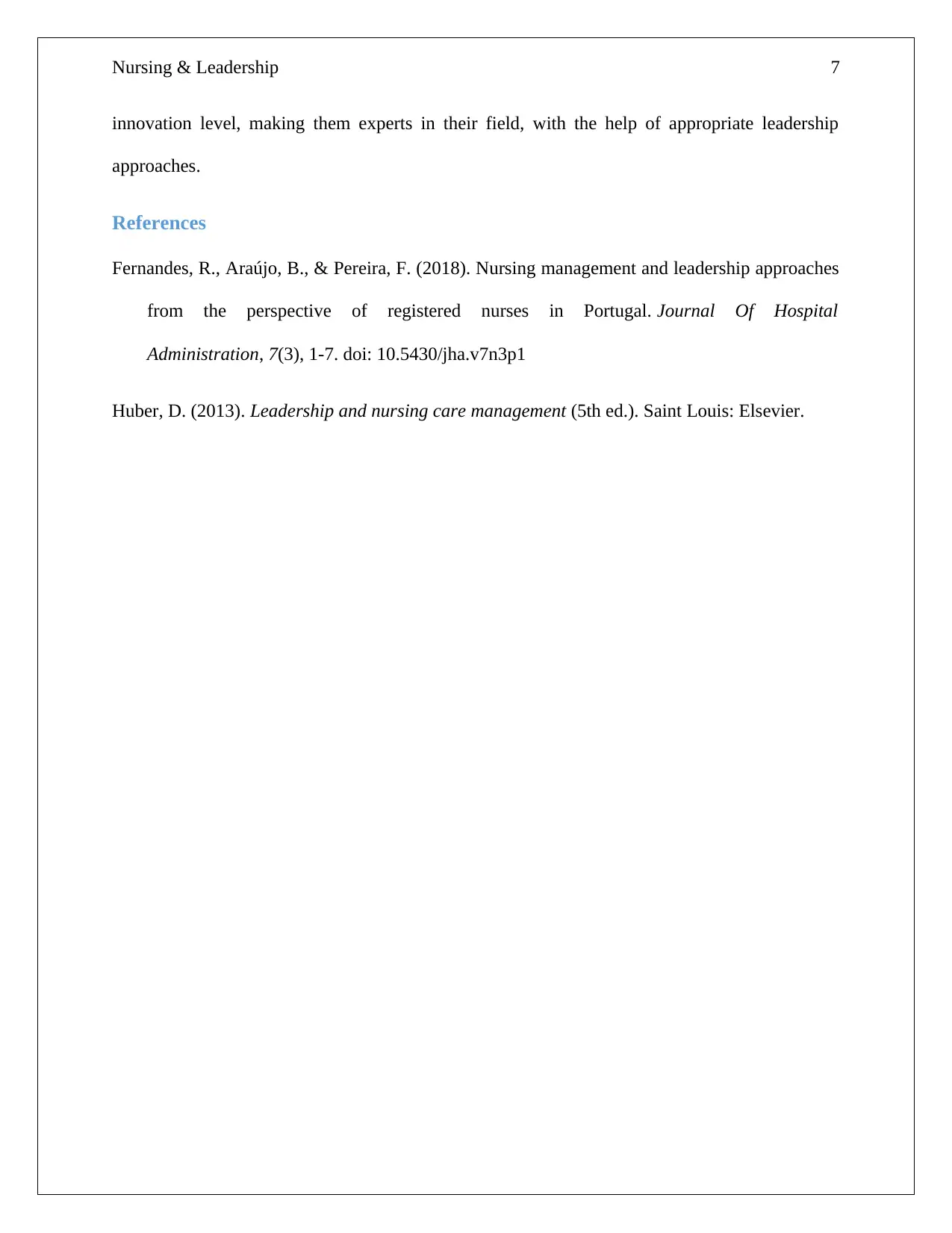
Nursing & Leadership 7
innovation level, making them experts in their field, with the help of appropriate leadership
approaches.
References
Fernandes, R., Araújo, B., & Pereira, F. (2018). Nursing management and leadership approaches
from the perspective of registered nurses in Portugal. Journal Of Hospital
Administration, 7(3), 1-7. doi: 10.5430/jha.v7n3p1
Huber, D. (2013). Leadership and nursing care management (5th ed.). Saint Louis: Elsevier.
innovation level, making them experts in their field, with the help of appropriate leadership
approaches.
References
Fernandes, R., Araújo, B., & Pereira, F. (2018). Nursing management and leadership approaches
from the perspective of registered nurses in Portugal. Journal Of Hospital
Administration, 7(3), 1-7. doi: 10.5430/jha.v7n3p1
Huber, D. (2013). Leadership and nursing care management (5th ed.). Saint Louis: Elsevier.
1 out of 8
Your All-in-One AI-Powered Toolkit for Academic Success.
+13062052269
info@desklib.com
Available 24*7 on WhatsApp / Email
![[object Object]](/_next/static/media/star-bottom.7253800d.svg)
Unlock your academic potential
Copyright © 2020–2026 A2Z Services. All Rights Reserved. Developed and managed by ZUCOL.
